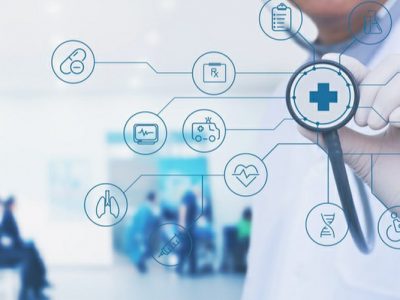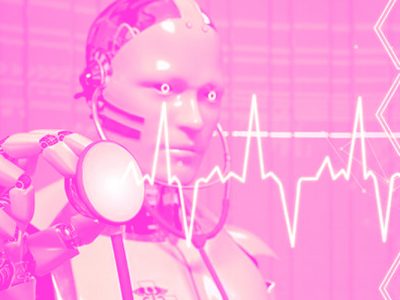
Although AI in Healthcare poses demanding challenges, it does have amazing opportunities to offer.
Artificial intelligence is one of the most sensational topics revolving all around the world. Due to the groundbreaking development of technologies, the utilization of AI in the healthcare industry is spectacular. The progress in medicine and pharmaceutical research powered by AI systems has been farfetched, and more is yet to be witnessed in the coming decades. Due to such empowerment in Healthtech, this field attracts diverse individuals to be a part of these intriguing researches and operations.
However, along with such extraordinary experiences, AI-powered Healthcare poses some unique challenges on its own. Due to the Big Data transformation, the complexity of handling, extracting, and securing valuable data has increased many folds, and healthcare is a storehouse of crucial historical medical and personal data.
Below listed are some of the potential threats and challenges of using AI in Healthcare:
Challenges of AI in Healthcare:
The complexity of using and managing Data:
Using machine learning or big data in other industries is fundamentally different from designing and applying AI systems in healthcare.
Experiences of two patients are never the same in healthcare, meaning each patient’s data recorded will be for different reasons and may be recorded differently by clinicians for the same patient. Thus the volume and category of the collected data for every patient differ according to the various clinicians present. Thus making the extraction process a lot more complex.
Lag in feedback timelines:
Timelines in healthcare take longer to show up as a built-in AI tool used to control patient outcomes may take several weeks to start collecting any feedback at all.
Ethical problems:
In the AI-enabled healthcare industry, ethical challenges prevail too. Unlike any other industry using AI tools, in a healthcare setting, the question is literally about life and death. Any mistake made in the design or implementation or technical failure can potentially lead to not just one but multiple loss of lives.
Risk of Loss of valuable data:
The fear of data breaches in the digital world is a concerning issue in itself already. But the data present in the healthcare sector are extremely sensitive and private. The loss, manipulation, or breaching of these data can result in possible danger to the entire industry.
There are millions of patients in real-world healthcare datasets, but by the time one filters down to relevant cases for training a particular algorithm, those datasets are reduced to hundreds of thousands or even less. This is a fraction of the size of what the most popular AI algorithms are trained on in other environments.
The difference in Optimization goals:
In the healthcare industry, the optimization aims are also varied. While accuracy is vital in healthcare, health outcomes are considerably more important. False negatives have more serious repercussions in clinical settings than false positives.
Smaller databases:
Databases in healthcare are far smaller in comparison, which means there will be lesser training data available to learn from the AI algorithms.
Opportunities of using AI in Healthcare:
Vast learning opportunities for AI:
Although the challenges are standing erect, the opportunities offered and the promise made in Healthcare are not to be denied. Presently, in practicing medicine and healthcare, it is next to impossible to learn from the huge amounts of patients’ record on their experiences and outcomes which is generated daily. This is where the contribution of using AI in the healthcare setting comes to the rescue. An AI tool could easily analyze, learn and scan from the outcomes and problems of thousands of patients and the expertise of clinicians, significantly improving the treatment and diagnosis in healthcare systems.
Offering better assistance:
In healthcare, AI systems will never be able to take the role of doctors. Instead, they will assist each doctor in accomplishing more than they could previously. AI tools allow doctors and nurses to read X-rays, assess test findings, identify and cure unusual disorders, and more. After the pandemic, there has been a shortage of medical staff. Therefore, anything that will assist doctors to expand their capabilities will be extremely beneficial.
Augmented workforce:
AI solutions could potentially free up time for busy clinicians to focus on more important responsibilities. To capture data, most clinicians nowadays have to manually enter records from a patient visit into an electronic medical record. Similarly, during appointments, therapists take handwritten notes that are later entered into an EHR. By capturing speech in real-time, AI systems could replace the necessity of human note-taking, allowing clinicians to focus entirely on the patient in front of them.
Improved analysis and synthesis of data:
In the end, AI technologies may be able to synthesize and analyze a variety of data sources, such as data provided by digital symptom tracking, wearable sensors, and visits paid to a doctor, to create a more comprehensive picture of the patient. AI might also help with healthcare logistics by scheduling appointments and surgeries, as well as advising on staffing levels at various periods of the week and year.
AI in Healthcare has to overcome many hurdles because of ethical standards set while protecting patients’ data. The current system has a number of vulnerabilities. If AI technologies can help doctors detect potentially dangerous problems earlier, enhance diagnoses, and provide individual doctors better accessibility to the collective wisdom of thousands of their peers, AI may be able to lower this type of risk – and potentially save multiple lives.



















